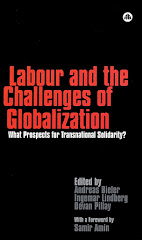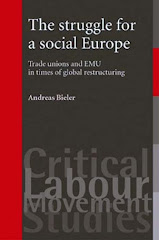The production of aluminium
is based on the destruction of the environment and exploitation of workers in
the Global South and North alike, reported Frank Meyer, the Director of ARBARK, the Archive and Library of the Norwegian labour movement, to the transnational labour project
at the Centre for Advanced Study in Oslo.
In this blog post, I will provide an overview of Frank Meyer’s key points in
relation to his comparative case study of Porto Trombetas in Brazil and Årdal
in Norway and reflect on the possible involvement of trade unions in resisting
exploitation in the aluminium industry.
Porto Trombetas: the high environmental and social cost of bauxite
extraction.
The Brazilian town of Port Trombetas is an important
port for bauxite extraction, the raw material necessary for the production of
aluminium. Located in the Amazon rainforest, the environmental destruction
takes mainly place at three levels. First, in order to extract bauxite, the
trees and top layer of earth need to be removed. As re-foresting is almost
impossible, some local people describe the area as ‘a desert as far as the eye
can see’. Second, there is an enormous degradation of fresh water as a result
of bauxite extraction leaving indigenous people without access to drinking
water. Third, the large cargo ships transporting the bauxite to smelters in the
North release salt water in the port, which they had taken on in order to be
stable in their voyage across the ocean to Brazil. Fish and other life forms
are destroyed as a result.
 |
| Photo Norsk Hydro ASA |
The social problems are equally harsh. The indigenous
people, who had lived in this area before the mining, were already removed
before the mines were established. In order to set up the mines, 6000
temporary, migrant workers were brought in, only to be sent home and replaced
by 1000 well trained workers, once they had established the mines. Workers in
the mines themselves are well looked after with good houses, schools for their
children and a hospital. Nevertheless, they live in a gated community and
people from local villages, descending from runaway slaves, have no access to
these facilities. Similarly disastrous for the latter is the pollution of the
river undermining their traditional form of life based on hunting and fishing.
In short, parts of the population were displaced due to the mines, while the
remaining people live in segregated and highly unequal communities.
 |
| Photo by Norsk Hydro ASA |
Årdal: the high cost of ‘modernisation’.
While bauxite has traditionally been extracted in
countries in the Global South, aluminium smelters were generally established in
the North. The aluminium smelter in Årdal, actually fully established during
German occupation of Norway in World War Two, became a focus of
industrialisation and modernisation after the war. And yet, while social
democratic governments ensured that conditions for workers and wider society
improved, the impact on the local environment and people was equally harsh at
least at the beginning. For years, the toxic smoke of the smelting process
polluted the surrounding country and led to the death of farmers’ live stock as
well as diseases amongst the workers, who were closely exposed to it. Moreover,
in Årdal too migrant workers had been brought in initially to set up the
smelter, including forced Serbian labour by the German occupiers.
 |
| Photo by Norsk Hydro ASA |
Despite Årdal’s model character for the Norwegian social democratic order, some jobs at the factory could not be saved, when global restructuring in the aluminium industry hit. Norsk Hydro, an increasingly important transnational corporation in this particular sector, was involved in shifting parts of production to Mesaieed in Quatar, where it participated in the construction of the world’s largest smelter.
Resistance: what role for trade unions?
 |
| Photo by andrefromont |
At first sight, it is logical why trade unions focus
on jobs and working conditions for their members. These are inevitably the
issues closest to home. Nevertheless, and Frank Meyer’s presentation made this
clear, in spite of the cooperation with employers, the destruction of the
environment and the negative implications for workers’ and their families’
health affect union members in both the Global South and North. Moreover, in
spite of the cooperation with employers, jobs are ultimately never secure. As
soon as higher profitability levels are on offer elsewhere, companies move with
little consideration for the impact on local communities. In short, there are
ample reasons for why workers in the Global South and North should co-operate
in defending their jobs and the environment.
 |
| Photo by Norsk Hydro ASA |
Frank Meyer’s research on Porto Trombetas, Årdal and the aluminium industry has been
published in Borges, J. Marcelo and Susana B. Torres (eds.) (2012) Company Towns:
Labor, Space, and Power Relations across Time and Continents.
London: Palgrave.
16 January 2014
Prof. Andreas Bieler
Professor of Political Economy
University of Nottingham/UK
Personal website: http://andreasbieler.net













No comments:
Post a Comment
Comments welcome!